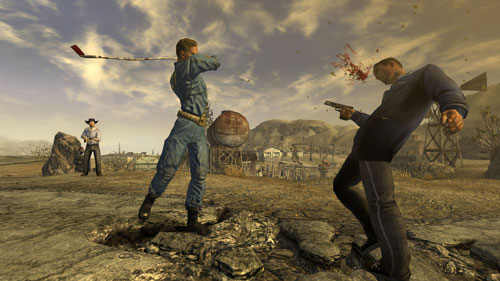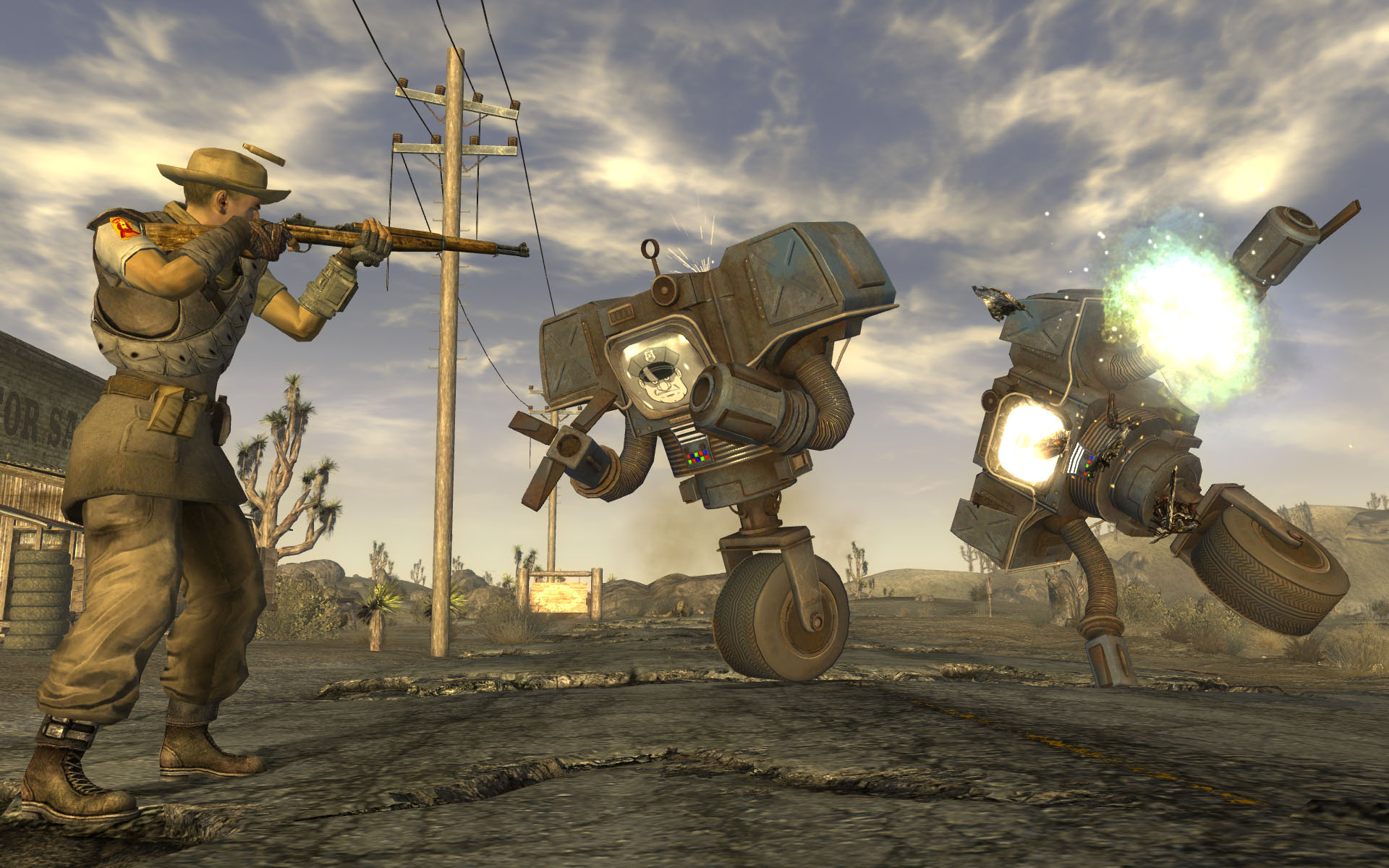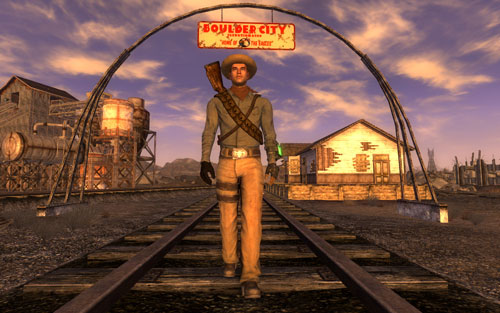Fallout: New Vegas opens with a shot to the head.
Two of them, in fact.
You're a courier carrying something valuable for the mysterious Mr. House. Now, after being left to die, you must find out who tried to have you killed and why.
That's the basic, but very effective setup to Fallout: New Vegas, the follow up to Bethesda's 2008 Game of the Year Fallout 3.
If you played the old PC game Fallouts or Bethesda's title, I'll save you the suspense: Fallout: New Vegas manages to be a worthy successor to both traditions.
The Fallout world revolves around a great conceit: the future of 2077 as imagined in the 1950s. The nuclear family of Leave it to Beaver tools around in nuclear powered Edsels driven by Don Draper-like fathers with June Cleaver mothers at their side.
But underneath the blissful utopian facade, there's trouble. Conflict with Communism turned America into a fascist security state, inevitably leading fascist America and Communist China into a devastating nuclear war.
Some survived the war in underground bunkers called Vaults. When they emerged from these vaults, radiation worked comic book like mutations on plants, animals, and people.
Some survivors of the nuclear apocalypse became pure savages and Mad Max-style raiders. Others tried, with varying levels of success, to derive meaning from the old world.
It's the world of 2281, 200 years after the bombs fell, in which the adventures in Fallout: New Vegas take place. Naïve 50s' enthusiasm about the future meets the bleakest dystopia imaginable and the result is absolutely fascinating.
The Fallout world has always been known for its wry sense of humor and complex role playing. New Vegas has both in spades. While Fallout 3 was an excellent title in its own right, it tended towards violent solutions to problems.
New Vegas is far more rewarding of diplomacy. There are truly bad guys and pretty good guys in New Vegas, but more often than not the characters operate in shades of gray, allowing the player to form alliances and negotiate their way through situations rather than simply blasting through the game.

The results of a failure to communicate.
Like a Pixar film, Fallout: New Vegas plays simultaneously to kids and adults. It is possible to be a pure agent of wrath and raze all that stands before you. But it is just as possible to gauge a situation and role play an intelligent solution to the problems your character faces.
Overall, Fallout: New Vegas is as subtle and interesting as a first (or third) person shooter can be. Not as polished as Mass Effect 2 or Red Dead Redemption, Fallout: New Vegas is nevertheless just as interesting as either--both contenders for game of the year in their own right.
Players of New Vegas will discover a rich world that truly can be approached in a variety of different ways, all leading to interesting and really different outcomes. Be a ruthless pragmatist or a shiny idealist if you want. Finesse your way through the game or kill them all and let god sort them out.
Take the side of the squishy bureaucrats of the New California Republic or the viciously clear-cut puritans of Caesar's Legion. Honor your contract to Mr. House or follow your own path. Race to the finish or admire the view. Here is the freedom promised by so many games of this generation made real.
What I like most about this title is that there are real consequences for almost all of the character's actions. You might get away with stealing, but it's hard to get away with killing someone--or for that matter, letting them live when you shouldn't.
In this sense, Fallout: New Vegas is a lot realer and provides a richer message than many Hollywood blockbusters.
If that's the brains of New Vegas, what about its guts?
Like most roleplaying games, leveling and loot collection are important.
The basic interface and combat system in Fallout: New Vegas is a heavily tweaked version of Fallout 3. But where it was possible to create a superhuman master of all trades in Fallout 3, ultimately rendering the game's challenges unchallenging, Fallout: New Vegas makes your life a lot harder--and more satisfying.
Ditto the loot.
By the end of Fallout 3, the player would be likely to saying to him or herself: "geez, not another plasma rifle and Hellfire power armor!" For much of New Vegas, finding a 10mm submachine gun is a happy--and rare--occurrence.
Combat remains more or less the same, with the difference being that your character is weaker than his or her Fallout 3 counterpart. You can't stand toe to toe with a Deathclaw in New Vegas.

Or an upgraded Securitron.
I played the game in "hardcore" mode, the upshot of which is you get three more counters to manage: food, water, and sleep, in addition to your radiation and hit points. You also heal over time and not all at once. In addition your companions can die.
The healing over time and companion death provide some welcome realism. The other stuff amounts to tedious micromanagement that most players will not be interested in.
In terms of micromanagement, New Vegas also introduces more crafting options. Now you can make potions, items, and ammo at various crafting stations. This is a neat idea, but in practice I don't find myself using the option very often.
Graphically, although design house Obsidian has done a decent job implementing upgrades, it remains the same four year old engine that powered Bethesda's Oblivion.
That brings me to another point.
It's customary to open video game reviews with a reference to Pong and the wry observation that video games sure have come a long way from the days of blinking squares and bouncing balls of light. This has always struck me as a bizarre thing to say. It's as if Roger Ebert should open his reviews by observing how far film has come since the still photograph.
Yet there's a very important truth buried in that cliché, which is that game technology has progressed so fast that games which we marveled at a mere few years ago now simply don't make the grade for many gamers.
This is a shame. Baldur's Gate II, one of the best role playing games ever made, has ancient graphics and a creaky interface, yet the richness of the gaming experience is unparalleled. (Ditto Planescape: Torment, the lead designer of which, Chris Avellone, was a senior designer on Fallout: New Vegas.)
New Vegas's graphics may no longer wow jaded gamers, but its story will likely be wowing them for many years to come.
Obsidian, to whom Bethesda handed over the reins, is best known for giving really intriguing twists to franchises. They are also known for their buggy, incomplete releases.
Star Wars Knights of the Old Republic (KOTR) II is a classic example of Obsidian's work. Set long before the events of the movies, KOTR II took the familiar source material and gave it new energy--literally, as the Force was re-conceived through the eyes of a mysterious Jedi/Sith as a malevolent force twisting the lives of all it touched.
Unfortunately, it also featured a cursory ending and bugs that frustrated many players.
With that history, it's unsurprising that the gaming press has focused on the "buggy brilliance" legacy of Obsidian.
In the case of Fallout: New Vegas, however, its much more brilliant than buggy.
To be sure, the internet is full of reports of bugs ending quests prematurely and crashing games. The effects of these errors are something like bloopers or continuity errors in a film or a projector failing in a cinema respectively. The effect is to jar one out of the immersive experience of the game. Fallout: New Vegas had these in spades in the first week I played. (Not one since a recent patch, however.)
Other complaints are not so much bugs, but the consequence of the complicated options that the player has available to herself. Often one has to string together complicated sequences of actions in FO: NV, much like an old school platformer where a single missed jump dooms you. Although there are helpful hints on the screen, the game doesn't always hold your hand through these sequences.
It's not surprising, then, that there are tricky, apparently bugged quests that are likely to confuse the player.
Some of these quests are ultimately hugely rewarding. When I realized that I could complete one quest without killing anyone, it was tremendously satisfying. Ah ha! I had to dress up as one of them! They weren't all bad--so I wasn't rewarded for killing them. Now it makes sense!
Another simply didn't make much sense any way you sliced it--after the group you are trying to recruit turns on your competition, the group members keep blithely chatting about their great alliance with the bad guys--while stepping over their emissary's body.
Obsidian and Bethesda appear to be very proactive in addressing Fallout: New Vegas's bugs--a welcome departure from Obsidian's last release, Alpha Protocol.
A robust community has already sprung up around Fallout: New Vegas, as befits a game that has sold five million copies. Gamers will find help on the internet for problems, as I did when my load times became interminable. (Clear the game cache by holding left bumper + right bumper + x through the title screen load sequence.)
None of this is enough to mar the overwhelming brilliance of the world that Obsidian and Bethesda have created. Fallout: New Vegas is truly is an impressive, endlessly fascinating game.
Lead designer Josh Sawyer once wrote (of the eventually canceled project that was meant to be Fallout 3) that his ambition was to create a role playing game in which: "the player is free to pursue many different attitudes, roles, and paths through the game's plots and feel rewarded for their choices."

Another Lone Wanderer?
Fallout: New Vegas is a brilliant realization of Sawyer's ambition.
It's also one of the best games of the year.
Available on Xbox 360 (the version I played), PS3, and PC.